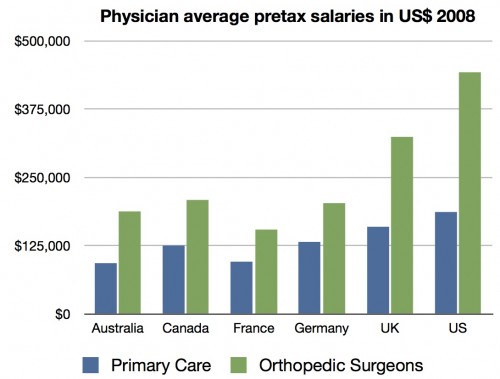Lexicus
Deity
So the real question is why anyone who was freaking out over the 10% going to the 21% doesn't support Medicare for all which would bring the 10% down to a 0%.
So the real question is why anyone who was freaking out over the 10% going to the 21% doesn't support Medicare for all which would bring the 10% down to a 0%.
But the root of the current system, Palmer says, can be found in World War II. In 1943 president Franklin D. Roosevelt imposed an effective freeze on labor wages, and companies started offering health and pension benefits as a way to retain workers instead. This was the beginning of employer-sponsored healthcare, though there was no government mandate to offer it (except in Hawaii). Unions began negotiating the benefits as part of what they could obtain for workers. The rest of the population wasn’t covered, but it meant the unions didn’t put pressure on the government to create a public health system.
Another turning point, Palmer says, was an exceptionally successful campaign by Clem Whitaker and Leone Baxter, the founders of Campaigns, Inc.—”the first political consulting firm in the history of the world,” as The New Yorker’s Jill Lepore described it (paywall). On behalf of the California Medical Association, the two opposed California governor Earl Warren’s 1944 plan to introduce compulsory health insurance in the state, paid for through Social Security. Lepore explains that their slogan, “political medicine is bad medicine,” was used to lobby newspapers (with which they had advertising relations) and the population against government intervention in matters of health. They reminded people that what they called “socialized medicine” was a German invention—it came from the same country American soldiers were fighting abroad.

This is exactly it. There are a million layers of middlemen. Gouging people for products that really can't avoid buying is one our nations biggest industries.It's like the way communism in Poland was so ineffective. There was a ton of useless bureaucracy, a ton of useless middlemen and women, and not the way to go if you want an efficient system in place.
In the U.S. the healthcare system has all these middlemen and women who are there to just make money. It's not a system designed to be efficient, so it's not efficient.
Some interesting numbers - it seems like the nations with the highest live expectancy also have the highest suicide rates.There's an animated graph here that I can't copy over. The US is the only country where increased healthcare spending does not result in improved healthcare outcomes.
Some interesting numbers - it seems like the nations with the highest live expectancy also have the highest suicide rates.
I am a bit shocked by the high infant mortality in the US - it seems to be the 4th highest out of the 35 listed after Chile, Turkey and Mexico. It also seems to be roughly twice as high as in the other western nations.




"Pro-life" Americans could not possibly care less whether the children live or die. The only thing that matters to them is that the mother does not have a choice.
There is a very high correlation between which states have the most restrictions on abortion services:

And states that have high infant mortality:

Child mortality as a whole:

And the deaths of the mothers themselves:

"Pro-life" Americans could not possibly care less whether the children live or die. The only thing that matters to them is that the mother does not have a choice.
"Pro-life" Americans could not possibly care less whether the children live or die. The only thing that matters to them is that the mother does not have a choice.
.!.. ..!.
Yep, no other response except to get mad at someone pointing out the truth.
